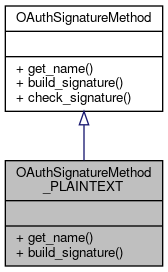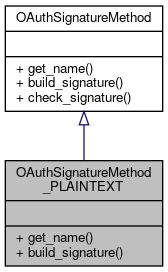The PLAINTEXT method does not provide any security protection and SHOULD only be used over a secure channel such as HTTPS. More...
 Inheritance diagram for OAuthSignatureMethod_PLAINTEXT:
Inheritance diagram for OAuthSignatureMethod_PLAINTEXT: Collaboration diagram for OAuthSignatureMethod_PLAINTEXT:
Collaboration diagram for OAuthSignatureMethod_PLAINTEXT:Public Member Functions | |
| get_name () | |
| Needs to return the name of the Signature Method (ie HMAC-SHA1) More... | |
| build_signature ($request, $consumer, $token) | |
| oauth_signature is set to the concatenated encoded values of the Consumer Secret and Token Secret, separated by a '&' character (ASCII code 38), even if either secret is empty. More... | |
 Public Member Functions inherited from OAuthSignatureMethod Public Member Functions inherited from OAuthSignatureMethod | |
| get_name () | |
| Needs to return the name of the Signature Method (ie HMAC-SHA1) More... | |
| build_signature ($request, $consumer, $token) | |
| Build up the signature NOTE: The output of this function MUST NOT be urlencoded. More... | |
| check_signature ($request, $consumer, $token, $signature) | |
| Verifies that a given signature is correct. More... | |
Detailed Description
The PLAINTEXT method does not provide any security protection and SHOULD only be used over a secure channel such as HTTPS.
It does not use the Signature Base String.
- Chapter 9.4 ("PLAINTEXT")
Member Function Documentation
◆ build_signature()
| OAuthSignatureMethod_PLAINTEXT::build_signature | ( | $request, | |
| $consumer, | |||
| $token | |||
| ) |
oauth_signature is set to the concatenated encoded values of the Consumer Secret and Token Secret, separated by a '&' character (ASCII code 38), even if either secret is empty.
The result MUST be encoded again.
- Chapter 9.4.1 ("Generating Signatures")
Please note that the second encoding MUST NOT happen in the SignatureMethod, as OAuthRequest handles this!
Reimplemented from OAuthSignatureMethod.
Definition at line 184 of file OAuth.php.
References $key, $request, PHPMailer\PHPMailer\$token, and OAuthUtil\urlencode_rfc3986().
 Here is the call graph for this function:
Here is the call graph for this function:◆ get_name()
| OAuthSignatureMethod_PLAINTEXT::get_name | ( | ) |
Needs to return the name of the Signature Method (ie HMAC-SHA1)
- Returns
- string
Reimplemented from OAuthSignatureMethod.
Definition at line 170 of file OAuth.php.
The documentation for this class was generated from the following file:
- libs/composer/vendor/simplesamlphp/simplesamlphp/modules/oauth/libextinc/OAuth.php



